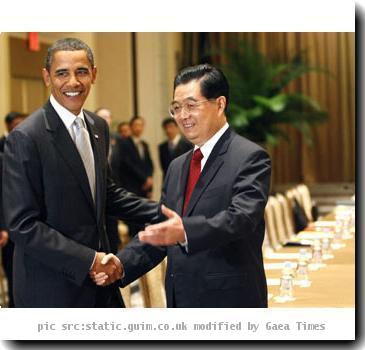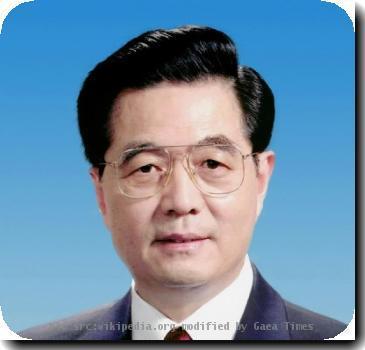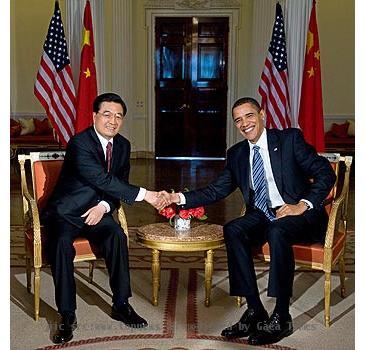Flags at half-staff in China as country mourns 2,000 quake victims
By Tini Tran, APWednesday, April 21, 2010
China mourns earthquake victims
BEIJING — Bowing their heads in silent tribute, thousands of officials, soldiers and civilians gathered Wednesday in ceremonies across China to mourn the 2,064 victims killed in a devastating quake that hit one week ago in a remote Tibetan region.
Conspicuously absent from all the televised ceremonies were any Tibetan Buddhist monks. The monks, thousands of whom poured into the quake zone from surrounding areas to help, said Wednesday they had been ordered to leave the region — an apparent sign of the Communist Party’s unease over the leading role they played in the relief effort.
At the quake’s epicenter in Yushu County in western Qinghai province, hundreds of rescue workers, residents and children in school uniforms stood quietly for a nationally televised ceremony held on a hill with rubble from destroyed buildings behind them.
Red Chinese flags flew at half-staff as the blaring of horns and sirens from cars, police vehicles and ambulances sounded in the background after three minutes of silence that began at 10 a.m.
Dressed in black with a white flower pinned to his chest, Qiang Wei, Communist Party secretary for Qinghai province, called on people to unite and rebuild in the wake of the quake, which also left more than 12,000 people injured.
“The earthquake showed no mercy, but we have love. Let us wipe our tears off … and strive to meet a brighter tomorrow and let a more beautiful, wealthy and socialist Yushu stand on the vast Tibetan Plateau,” he said.
In Beijing, President Hu Jintao, along with other Chinese leaders, led a silent tribute “to express our profound condolences” during a Politburo meeting, while soldiers in Tiananmen Square lowered the national flag to half-staff in the early morning as students in school uniforms saluted.
Yixi Luoren, the head of the Gengqing Monastery in Sichuan province, said 150 monks from that temple had been sent to the quake zone but 120 of them had left by Wednesday on orders from the Religious Affairs Bureau and the Communist Party United Front department in Ganzi prefecture, where the monastery is located.
“They told us to do so on the phone,” he said. “The authorities didn’t tell us the reason, but we assume they might worried that there are too many people there and wanted us to come home safely.”
The Beijing-based Tibetan poet and activist Woeser said Han and Tibetan acquaintances in the quake zone told her that similar orders were given to monks from several other monasteries. She said the monks were upset and not willing to go but had no choice.
“Local officials told them through translators in Tibetan ‘You’ve done everything already. You’ve done too much. You have to leave Yushu now, otherwise there will be trouble,’” she said.
Monks have worked alongside soldiers digging out survivors and took charge of funeral rites for most, if not all, of the deceased. But Chinese state media have largely played down their contributions, focusing instead on efforts by the military and armed police.
In the past, Beijing has demonized Tibetan monks for their loyalty to the Dalai Lama, their exiled spiritual leader, whom the government insists is trying to fight for independence for Tibet.
The government said this week it is concerned that separatist forces could disrupt the quake relief work, but has not specifically accused monks of doing so.
China ordered a halt to all entertainment, including online games and sports events, for the national day of mourning. Newspapers across the country were printed in black and white, instead of color, to reflect the grave mood.
A charity show Tuesday night, broadcast nationwide by China Central Television, raised 2.175 billion yuan ($319 million) for the quake-hit region, with donations mainly coming from the country’s private and state-owned enterprises, entertainers, dignitaries, and news organizations.
A similar telethon held two years ago for the much deadlier earthquake in southern Sichuan province that left nearly 90,000 dead or missing raised 1.5 billion yuan ($220 million).
The Chinese government has poured in aid to Tibet and surrounding regions, such as Qinghai, where residents have frequently chafed under Chinese rule.
Tibetan anger over political and religious restrictions and perceived economic exploitation by the ethnic majority Han Chinese have sometimes erupted in violence.
The Voice of Tibet radio service, based is Oslo, Norway, said Chinese authorities have jammed broadcasts of recorded messages from Tibetans in exile to family and friends living in the quake region.
Oystein Alme, a spokesman for the service, told The Associated Press that Chinese authorities have blocked the broadcasts since the service began transmitting them Monday.
Alme said the service urged the Beijing government not to block Wednesday’s transmission, saying the messages would be broadcast separately from the service’s politically oriented programming.
__
Associated Press writers Alexa Olesen in Beijing and Ian MacDougall in Oslo and researcher Zhao Liang in Beijing contributed to this report.
Tags: Asia, Beijing, China, East Asia, Embassies, Greater China, Hu Jintao, Search And Rescue Efforts, Tibet


